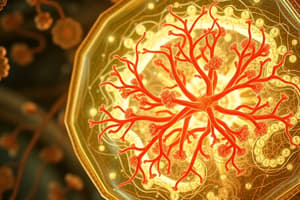Podcast
Questions and Answers
What is the primary focus of nutrition in an organism?
What is the primary focus of nutrition in an organism?
- To provide necessary nutrients for growth and maintenance (correct)
- To extract energy from food
- To synthesize food from inorganic substances
- To break down glucose into ATP
Which type of organism synthesizes its food from inorganic substances?
Which type of organism synthesizes its food from inorganic substances?
- Omnivores
- Autotrophs (correct)
- Heterotrophs
- Carnivores
What is the primary function of mitochondria in cellular respiration?
What is the primary function of mitochondria in cellular respiration?
- To provide enzymes for energy conversion and conservation (correct)
- To break down glucose into ATP
- To release oxygen as a byproduct
- To synthesize nutrients for energy and growth
What is the primary source of energy extracted during respiration?
What is the primary source of energy extracted during respiration?
What is the primary difference between aerobic and anaerobic respiration?
What is the primary difference between aerobic and anaerobic respiration?
What is the primary difference between aerobic and anaerobic respiration?
What is the primary difference between aerobic and anaerobic respiration?
What is the end product of lactic acid fermentation?
What is the end product of lactic acid fermentation?
What is the energy-rich molecule produced during respiration?
What is the energy-rich molecule produced during respiration?
What is the role of nutrition in cellular processes?
What is the role of nutrition in cellular processes?
What is the byproduct of aerobic respiration besides ATP?
What is the byproduct of aerobic respiration besides ATP?
Which process is responsible for breaking down glucose to release energy?
Which process is responsible for breaking down glucose to release energy?
What is the efficiency of anaerobic respiration compared to aerobic respiration?
What is the efficiency of anaerobic respiration compared to aerobic respiration?
Study Notes
The Processes of Life: Nutrition and Respiration
Life processes are the fundamental activities that all living organisms perform to maintain their existence. These processes include nutrition, respiration, digestion, excretion, reproduction, and metabolism. Nutrition and respiration are two crucial processes that ensure the survival and growth of any organism.
Nutrition
Nutrition is the process by which an organism obtains food and utilizes it for energy. The primary focus of nutrition is to provide the necessary nutrients, such as carbohydrates, proteins, and fats, that are essential for the body's growth and maintenance. The mode of nutrition can vary between species, with autotrophs synthesizing their food from inorganic substances (e.g., photosynthesis in plants) and heterotrophs obtaining their nutrients from other organisms or their own stored reserves.
Respiration
Respiration is the process by which an organism extracts energy from food, primarily in the form of ATP, through a series of metabolic reactions. These reactions involve the breakdown of glucose, which releases energy that can be used by the body. Respiration can be further classified into aerobic and anaerobic processes, depending on whether oxygen is present or not.
Aerobic Respiration
Aerobic respiration is the process by which organisms use oxygen to extract energy from food. This process occurs in the mitochondria of eukaryotic cells and involves three main stages: glycolysis, the Krebs cycle (also known as the citric acid cycle), and oxidative phosphorylation. During aerobic respiration, glucose is broken down to produce ATP, water, and carbon dioxide as byproducts.
Anabolic Respiration
Anabolic respiration, also known as fermentation, is an anaerobic process that allows organisms to produce ATP in the absence of oxygen. This process is less efficient than aerobic respiration, as it only produces a small amount of ATP. Fermentation can be further classified into lactic acid fermentation and alcoholic fermentation, depending on the end product of the process.
Role of Mitochondria
Mitochondria play a crucial role in cellular respiration by providing the enzymes required for the individual steps involved in respiration and energy conservation. These organelles are responsible for the conversion of energy contained in chemical bonds into the energy-rich compound ATP, which is then released to fuel other cellular processes.
In conclusion, nutrition and respiration are two essential life processes that ensure the survival and growth of all living organisms. Nutrition provides the necessary nutrients for energy and growth, while respiration extracts energy from food through a series of metabolic reactions. The efficiency of these processes can vary, with aerobic respiration being more efficient but requiring oxygen, and anaerobic respiration being less efficient but functioning in the absence of oxygen.
Studying That Suits You
Use AI to generate personalized quizzes and flashcards to suit your learning preferences.
Description
Learn about the fundamental processes of life, including nutrition and respiration, which are essential for the survival and growth of all living organisms. Understand how these processes work, including the different types of respiration and the role of mitochondria.




